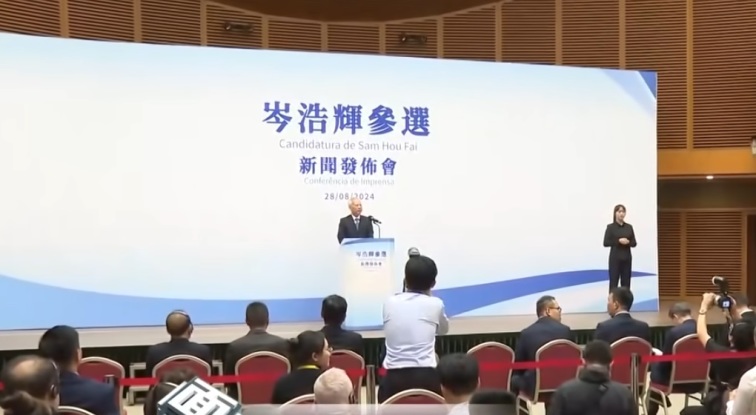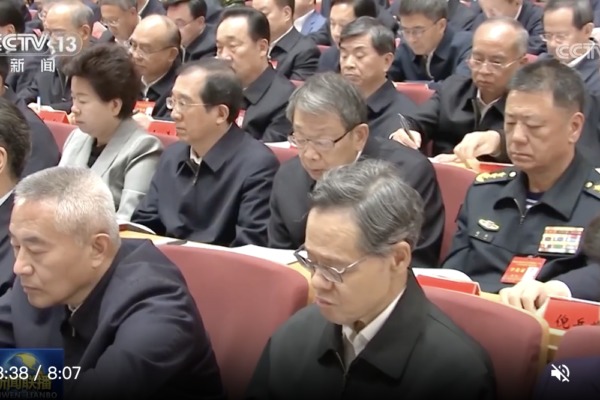Photo Caption: The first session of the 14th National People's Congress will open on March 5, 2023, at the Great Hall of the People in Beijing, China. (Photo by Lintao Zhang/Getty Images)
People News - According to Chinese state media, a symposium commemorating the 100th anniversary of the birth of Zhu Guangya, an academician of the Chinese Academy of Sciences and a nuclear scientist, was held in Beijing on December 25. Wang Huning, a member of the CCP Politburo Standing Committee and Chairman of the Chinese People’s Political Consultative Conference (CPPCC), attended the symposium. CPPCC Vice Chairman Hu Chunhua reviewed Zhu Guangya’s life and contributions. The CPPCC hosting this symposium is unusual. While Zhu Guangya once served as Vice Chairman of the CPPCC, by convention, figures who have contributed significantly to China’s nuclear industry are typically commemorated by the State Administration of Science, Technology, and Industry for National Defense (SASTIND) or its subordinate body, the China Academy of Engineering Physics.
For reference, consider the symposium held in June this year to commemorate the 100th anniversary of Deng Jiaxian’s birth. Both Deng Jiaxian and Zhu Guangya were key figures in China’s nuclear weapons research and made significant contributions to the CCP’s nuclear program. However, despite their similarities, the relationship between the two was reportedly less than amicable.
A 2022 article by Lu Cang, titled "Rivalry Between Two Pioneers of Nuclear Weapons Research—A Comparison of Their Biographies", revealed several parallels and differences between the two scientists: Both were born in 1924 and graduated from the Department of Physics at Southwest Associated University in 1945 at the age of 21. Both earned PhDs in physics from American universities within two to three years and both joined the CCP in 1956. They also worked for the Ministry of Nuclear Industry.
Differences: Deng became the Director of the Theoretical Department at the Ninth Research Institute of the Ministry of Nuclear Industry (also known as Institute 9) in August 1958 and later served as Deputy Director and Director, though his name remained classified. Zhu, on the other hand, was appointed Deputy Director of the Ministry’s Nuclear Weapons Research Institute (Director: Li Jue) 11 months later, with his name publicly known. Zhu was elected as an alternate member of the CCP Central Committee at the Ninth Party Congress in 1969 and the Tenth Congress in 1973, eventually becoming a full member at the Eleventh Congress in 1977. Deng, however, only became a Central Committee member in 1982. In 1970, Zhu Guangya became Deputy Director of the National Defense Science and Technology Commission and Director of Institute 9, holding a position and rank significantly higher than Deng Jiaxian.
Interestingly, both Zhu Guangya and Deng Jiaxian elevated themselves while downplaying the other in their respective biographies. According to the article by Lu Cang, Zhu and Deng’s rivalry resembled the disputes between Yang Zhenning and Lee Tsung-Dao, with both pairs remaining at odds throughout their lives. However, both Zhu and Deng were recipients of the CCP's "Two Bombs, One Satellite" medal.
On June 25, the 100th anniversary of Deng Jiaxian’s birth, the China Academy of Engineering Physics held a symposium in Beijing, during which multiple experts reflected on the life and contributions of the "former director." Zhang Kejian, head of the State Administration of Science, Technology, and Industry for National Defense, also delivered a speech.
The China Academy of Engineering Physics, formerly the Ninth Research Institute of the Ministry of Nuclear Industry, is based in Mianyang Science City in Sichuan Province. The institute is responsible for the research and production of nuclear weapons and has branches in Beijing, Shanghai, and Chengdu. Its parent organization, SASTIND, is nominally under the State Council but has strong military ties. Zhang Kejian, as the head of SASTIND, held significant power.
Zhang Kejian attended the Deng Jiaxian symposium and several other similar commemorations in the past. It was therefore expected that he would also attend and speak at the Zhu Guangya symposium, given Zhu’s equal prominence in China’s nuclear development. However, Zhang’s absence was conspicuous, suggesting trouble for him.
Indeed, on December 26, the CCP announced during a leadership meeting at SASTIND that Shan Zhongde was appointed as the Party Secretary of SASTIND, replacing Zhang Kejian. Although Zhang retained the title of “comrade” and remained the director of SASTIND, it is highly likely that he is under investigation.
This development explains why the Zhu Guangya symposium was hosted by the CPPCC and why Zhang Kejian could not attend.
Public records show that Zhang Kejian graduated from the Department of Physics at the National University of Defense Technology, a military institution. He worked at the China Academy of Engineering Physics for many years, serving as its Party Secretary in 2007. In 2015, he was appointed Deputy Secretary and Deputy Director of SASTIND. In 2018, he became Vice Minister of the Ministry of Industry and Information Technology, Director of the National Space Administration, Director of the National Atomic Energy Agency, and Director of SASTIND.
SASTIND oversees major issues related to the research and production of weapons and equipment in fields such as nuclear, aerospace, aviation, shipbuilding, weaponry, and electronics, as well as the construction of core military capabilities. Reports indicate that Zhang Kejian, along with Lei Fanpei, the Executive Deputy Director of the Central Military-Civil Fusion Development Committee Office, was absent from the provincial and ministerial leadership meeting in October and the Central Economic Work Conference in December.
Amid a wave of corruption investigations targeting military officials and executives at state-owned defense enterprises—such as Wu Yansheng, then Chairman of China Aerospace Science and Technology Corporation; Liu Shiquan, then Chairman of China North Industries Group Corporation; and Wang Changqing, then Deputy General Manager of China Aerospace Science and Industry Corporation—Zhang Kejian’s troubles are likely significant.
Additionally, Zhang Kejian consistently praised Xi Jinping during his tenure and played a key role in signing a space cooperation agreement with Venezuela during Maduro’s 2023 visit to Beijing. Under the agreement, China and Venezuela planned to collaborate in areas such as space science, lunar exploration, satellite development, data applications, ground stations, launch services, and personnel training. This deal alone would have presented Zhang with opportunities to amass considerable personal wealth.
Given his close ties to Xi Jinping, Zhang might have been considered untouchable. His downfall, likely occurring after the Third Plenum in July, could be further evidence of Xi’s waning power and inability to protect his allies.
(First published by People News)











News magazine bootstrap themes!
I like this themes, fast loading and look profesional
Thank you Carlos!
You're welcome!
Please support me with give positive rating!
Yes Sure!